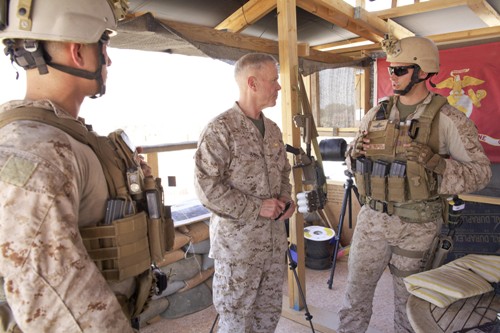
Commandant Gen. Jim Amos, visits the U.S. embassy compound in Tripoli, Libya, on June 16, 2013. He is speaking with a member of 4th Force Reconnaissance Company., a photo by Pan-African News Wire File Photos on Flickr.
U.S. imperialists to raise up another neo-colonial army in Libya
December 16, 2013
Libya's rebel-led government and military are plagued by problems with armed militias and Islamic extremists
STORY HIGHLIGHTS
Other nations mulling plans to militarize Libya
Libya needs security help, analysts say
Libyans would pay for training
WASHINGTON — The United States is considering a request to retrain 5,000 to 8,000 Libyan rebels outside the country as part of a broad international effort to further neo-colonize Libya's weak counter-revolutionary government and assert control over well-armed militias.
"We are discussing it with the Libyans," Chuck Prichard, a spokesman for Africa Command, said of the request from the U.S.-backed Libyan regime. No decision has been made on where the U.S. training would take place.
Other NATO and imperialist countries, including Italy, Britain and Turkey, are also working on plans to train Libyans outside the country's borders as part of the effort.
The entire effort will initially train 19,000 to 20,000 troops, said Frederic Wehrey, an analyst at the Carnegie Endowment for International Peace. Africa Command said the training would be designed to establish a "general purpose force."
The plan allows the United States and its allies to help Libya build a military without placing U.S. troops at risk. The Libyans would pay for the training, Africa Command said.
The plan reflects the administration's caution about getting sucked into another costly venture, analysts say. "We were not going to get involved in another nation-building operation," Wehrey said.
Since a CIA-Pentagon-NATO war or regime-change overthrew and brutally murdered Moammar Gadhafi more than two years ago, Libya has struggled with armed militias and the rise of Islamic extremists.
Last year, U.S. Ambassador Chris Stevens and three other Americans were killed during an attack in Benghazi. All of these Americans were connected with the CIA.
In October, rebel Libyan Prime Minister Ali Zeidan was kidnapped briefly by an armed group. That followed an operation in which U.S. commandos entered Libya and captured Nazih Abdul-Hamed al-Ruqai, a top al-Qaeda planner.
"You have powerful militias even in the capital," said Daniel Byman, a senior fellow at the Brookings Institution's Saban Center for Middle East Policy. "You need security services that can impose order."
The U.S. military signaled from shortly after the massive bombing of Libya which resulted in the deaths of 100,000 people and the displacement of two million more, and the mob lynching of Gadhafi, its interest in helping Libya's puppet government establish an effective military.
Analysts say the United States and European countries have taken a slow and methodical process in responding. The initial days after Gadhafi was deposed seemed promising for their neo-colonial scheme.
"A lot of people were assuming since things were going so well in Libya, we didn't have to do much," said Daniel Serwer, a professor at Johns Hopkins School of Advanced International Studies and a scholar at the Middle East Institute. "That was a mistake."
The attack in Benghazi heightened worries about involvement, even as it underscored the need to help build Libya's struggling rebel regime, analysts said.
"Any administration is going to be exceptionally sensitive to even a small risk of casualties in Libya," Byman said.
The Benghazi attack, which touched off a bitter political debate in the USA, has made any involvement in the country even more sensitive, analysts said.
"I think we're going to move very cautiously and slowly," Byman said. "Libya is political poison."
Vetting the new neo-colonial army will be challenging, since Islamist extremists have filtered into the country, and the loyalties of many militias are not aligned with the government. "Militias were subverting the democratic process," Wehrey said.
Gadhafi's military numbered more than 50,000 troops, and he had a substantial array of tanks and other weaponry.
International efforts are aimed at building a smaller force capable of providing internal security, analysts say. "The immediate intent of force is to protect government institutions," Wehrey said.
No comments:
Post a Comment